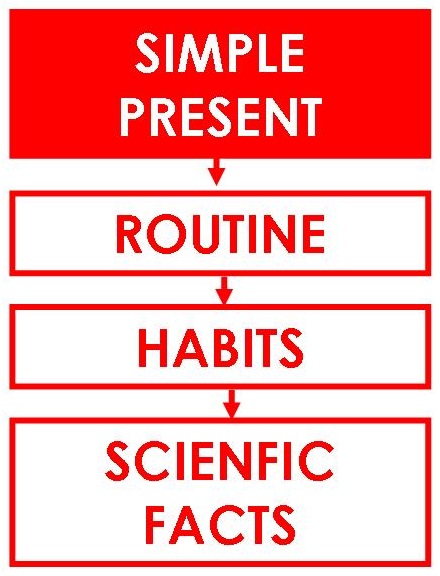
Resolva exercícios e atividades acadêmicas
Usamos o present simple (verb + (e)s / do/does (not)+verb:
• Para falar de hábitos do dia a dia ou ações repetidas.
I use the internet just about everday.
I always have coffee and toast for breakfast.
Encontre o professor particular perfeito
Adverbos de frequência que descrevem how often and when ex. always, usually, often, sometimes, rarely, never, every day, every evening são geralmente usados. Sendo colocados antes do verbo principal, havendo uma exceção com o verbo to be em que vem depois do verbo.
The tickets are usually cheaper on the internet.
• Para falar de situações permanentes.
My parents own a big house.
• Para contar estórias e falar sobre filmes, livros, etc.
In the filme, she falls in love with her boss.
• Para falar sobre fatos ou verdades geralmente aceites.
The British always say that everything is lovely. .
If you heat water to 100º C, it boils.
• Dar instruções e direções.
You go straight ahead to the traffic light, then you turn right.
To start the programme, first you click on the icon.
Usamos o present continuous ( am/is/are + verb + ing) :
• Para falar de situações temporárias.
My brother is living in Portugal at the moment
This week I'm cooking nearly every day.
• Para falar de ações que acontecem no momento da fala.
What are you looking for now ?
• Ou em torno de agora
Are you reading a good book at the moment?
• Para falar de mudanças.
The price of petrol is rising dramatically.
• Não esquecer de usar auxiliary verbs em perguntas.
Where do you live? NOT Where you live?
What are they doing? NOT what they doing?
• Alguns verbos precisam de uma preposição antes do substantivo:
Listen to (music) ou wait for (the bus)
• Em perguntass, a preposição é colocada no fim da frase.
Who are you waiting for? NOT For who are you waiting?
Where do you come from? NOT From where you come?
Who is she going out with? NOT With who is she going out?
Be careful with the pronunciation of the -s of the third person singular in present simple.
• Usar / IZ / com verbos com terminação no sons / ∫. t∫, Ζ, S, Κs, dℑ /
Watches / Wσt∫IZ / Mixes / mIKSIZ Judges / dℑ∧dℑIz /
• Usar /S / para verbos com terminação nos sons / p, t, k, f /.
Hopes / h∂ups Hates / heIts Looks / luks Laughs / la:fs
• Usar / Z/ para todos os outros verbos, incluindo verbos com terminação em som de vocal.
Agrees / ∂'gri:Z / Depends / dI'pendz / Comes / K∧mz / Lives / LIVZ / Calls / K⊃:Lz
No próximo blog continuarei a falar sobre TEMPOS VERBAIS.

